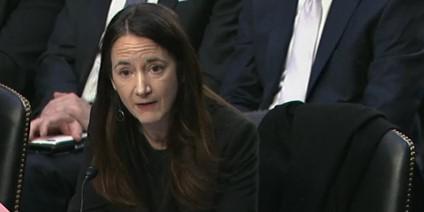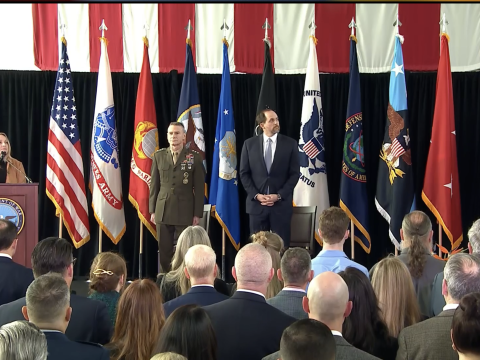The IC Assesses Putin's Costly War
Given Vladimir Putin’s invasion of Ukraine, which has been a shock to geopolitical order, and its continued threat to NATO and the United States, the U.S. intelligence community’s (IC's) tracking of Russian activities will remain a significant focus, reported Director Avril Haines, Office of the Director of National Intelligence.
The director of the Office of the Director of National Intelligence, or ODNI, spoke about Russia’s invasion during her—and fellow IC leaders’—testimony to Congress yesterday, when they presented the IC’s baseline of the most pressing threats to U.S. national interests as part of the unclassified report, 2022 Annual Threat Assessment of the U.S. Intelligence Community, which SIGNAL Magazine will cover in a subsequent article. The intelligence community is made up of 18 agencies, such as the CIA, FBI, Defense Intelligence Agency and now the U.S. Space Force.
Director Haines emphasized that the IC was able to provide advanced warnings of Russia’s intended actions and discern Putin’s false flag operations. “The IC provided warning of Putin’s plans, but this is a case where I think all of us wish we had been wrong,” the director noted.
And although the invasion has proceeded consistent with the plan the IC assessed the Russian military would follow, the Ukrainian response has been stronger than Putin had expected and Russia is encountering “serious” military shortcomings.
“Russia’s failure to rapidly seize Kyiv and overwhelm Ukrainian forces has deprived Moscow of the quick military victory that it probably had originally expected, [which] would have prevented NATO and the United States being able to provide meaningful military aid to Ukraine,” Director Haines said. “Moscow underestimated the strength of Ukraine’s resistance and the degree of internal military challenges.”
Moreover, Putin’s ill constructed plans, military morale issues and considerable logistical challenges make it “unclear at this stage” whether Putin will continue to pursue his “maximalistic” plan to capture more or all of Ukraine, “which we assess would require more resources even as the Russian military has begun to loosen its rules of engagement to achieve their military objectives,” the director noted. “If they pursue the maximalistic approach, we judge it will be especially challenging for the Russians to hold and contain Ukrainian territory and install a sustainable pro-Russian regime to Kyiv in the face of what we expected is to be a persistent and significant insurgency.”
In addition to Ukraine’s brave resistance, Director Haines also noted that NATO’s response has helped impact Russia, alongside the “western unity” of imposing sanctions, export controls and foreign commercial decisions, which are having what she called “cascading effects” on Russia.
NATO’s strong unified response to Russia’s invasion has had impacts, “not just in terms of economic measures but also in actions long thought to be off the table, such as the provision of lethal aid to Ukraine and shutting down European Union airspace to Russian planes—all of which almost certainly surprised Moscow,” the director stated.
“While Putin probably anticipated many of the current sanctions to be imposed when he weighed the cost of the invasion, we judge that he did not anticipate either the degree to which the United States and its allies and partners would take steps to undermine his capacity to mitigate western sanctions or the pullback from Russia initiated by the private sector.”
Even so, Director Haines warned that the U.S. intelligence community estimates that Putin “is unlikely to be deterred by such setbacks.” He may, in fact, escalate the conflict, “essentially doubling down to achieve Ukrainian disarmament and neutrality to prevent it from further integrating with the United States and NATO,” she reported.
In the meantime, the IC will continue to document Russia’s actions across Ukraine to hold Russia accountable, she noted.
The human toll of Putin’s war already is considerable and still widely growing, Director Haines emphasized. The IC estimates that the Russian and Ukrainian militaries already have probably suffered thousands of causalities, in addition to numerous civilian deaths.
“Russian forces are at the very least operating with reckless disregard for the safety of civilians as Russian units launch artillery and airstrikes into urban areas as they have done in cities across Ukraine,” Director Haines stated.
In addition, well more than 1 million people have fled Ukraine since the invasion, she said.
“We assess Putin feels aggrieved the West does not give him proper deference and perceives this is a war he cannot afford to lose, but what he might be willing to accept as a victory may change over time, given the significant cost he is incurring.”




Comments